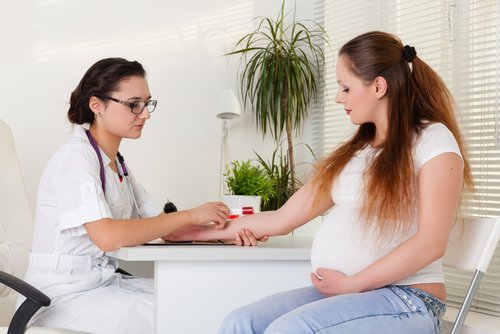Chlamydia During Pregnancy: What You Need to Know

Many women suffer the consequences of chlamydia during pregnancy, since this illness is almost symptom free. For that reason, early diagnosis is key.
In the case of a positive diagnosis, women should seek immediate treatment. This will help prevent damage during gestation and spreading the infection onto their newborns.
What is chlamydia?
Chlamydia is a bacterial infection that spreads through sexual contact. Around 75% of women with chlamydia don’t display any immediate symptoms. Just the same, the infection is potentially harmful.
Experts estimate that there are almost 3 million people with chlamydia. This makes it one of the most common sexually transmitted diseases. Women between the ages of 19 and 25 are the most likely to contract the infection.
How does chlamydia affect pregnancy
Women with chlamydia during pregnancy can suffer infections in the amniotic fluid and sac. They’re also at risk for early rupture of the mucus membrane and premature birth.
The chlamydia bacteria can cause salpingitis, a pelvic illness that inflames the Fallopian tubes. It can also lead to endometritis – in other words, swelling of the endometrium.
Women with chlamydia are susceptible to other sexually transmitted diseases, such as HIV (human immunodeficiency virus). At the same time, they’re at a great risk of suffering uterine infection after giving birth.
Another complication that this bacterial infection can cause – if untreated – is the infection of the wounds that occur during C-section. An untreated chlamydia infection raises the chances of spreading the infection onto the baby during birth.

The risks of chlamydia for newborn babies
If chlamydia goes untreated before birth, babies run the risk of being infected upon passing through the vaginal birth. This can cause various illnesses for the baby, as well as damage to body tissues.
Upon contracting infection, babies suffer an ocular infection called newborn inclusion conjunctivitis. This can produce strong discomfort and require medical treatment.
Another infection that newborns can suffer as a result of chlamydia is pneumonia. This represents a serious and dangerous complication that requires immediate medical attention. This illness can appear up to 4 weeks after birth.
“Around 75% of women with chlamydia don’t display any immediate symptoms. Just the same, the infection is potentially harmful.”
How to know if you have chlamydia during pregnancy?
As we mentioned above, the great majority of infected persons don’t present symptoms. If you’re at high risk for suffering this infection or suspect you may have chlamydia, seek immediate medical attention.
In general, symptoms appear one or two weeks after infection. Some of the signals include:
- Burning or discomfort while urinating.
- Pain during sexual intercourse.
- Swelling of the uterine wall or cervix.
- Increased vaginal discharge.
- On occasion, loss of blood, secretion through the urethra and pain in the lower pelvis.
Pregnant women who suspect they’re at risk for chlamydia should request testing at their first medical appointment. A specialist will draw a sample from the uterine wall or a urine sample to analyze in a laboratory.
If tests come back positive, further studies will follow in order to detect any other possible sexually transmitted diseases.
The treatment of chlamydia in pregnant women
The treatment of chlamydia during pregnancy involves antibiotics. Of course, your doctor will choose the antibiotic depending on the location of the wound and the type of patient.
Generally, treatment involves only one administration of the antibiotic, which is sufficient. The woman’s partner should also receive treatment at the same time.
Both individuals should avoid all sexual contact for 2 weeks after treatment to prevent spreading the infection.
Doctors advise patients to undergo further testing 3 to 4 weeks after completing treatment.

Natural treatment for curing chlamydia
Opting for plant-based treatments of chlamydia is a good option. Below are some of the most commonly used natural treatments:
Propolis
Propolis is a resinous mixture that honeybees produce and is one of the most effective natural antibiotics available. It effectively treats infections caused by virus, fungus and bacteria. It also has the capacity to calm pain and reduce the swelling that this illness causes.
Take 5 drops of propolis 3 to 5 times a day. For greater effectiveness, you can use it directly without an alcohol base. You can also dilute the drops in water and clean the affected area.
Tea tree essential oil
Tea tree oil has powerful antifungal and antibacterial properties. It absorbs unpleasant odors, favors the regeneration of cells and reduces swelling. The oil is to be applied topically and can be combined with oregano oil for oral treatment.
In conclusion, if you suffer from chlamydia during pregnancy, take measures as soon as possible to find a cure. That way, you can enjoy a happy delivery and avoid complications for your child.
Many women suffer the consequences of chlamydia during pregnancy, since this illness is almost symptom free. For that reason, early diagnosis is key.
In the case of a positive diagnosis, women should seek immediate treatment. This will help prevent damage during gestation and spreading the infection onto their newborns.
What is chlamydia?
Chlamydia is a bacterial infection that spreads through sexual contact. Around 75% of women with chlamydia don’t display any immediate symptoms. Just the same, the infection is potentially harmful.
Experts estimate that there are almost 3 million people with chlamydia. This makes it one of the most common sexually transmitted diseases. Women between the ages of 19 and 25 are the most likely to contract the infection.
How does chlamydia affect pregnancy
Women with chlamydia during pregnancy can suffer infections in the amniotic fluid and sac. They’re also at risk for early rupture of the mucus membrane and premature birth.
The chlamydia bacteria can cause salpingitis, a pelvic illness that inflames the Fallopian tubes. It can also lead to endometritis – in other words, swelling of the endometrium.
Women with chlamydia are susceptible to other sexually transmitted diseases, such as HIV (human immunodeficiency virus). At the same time, they’re at a great risk of suffering uterine infection after giving birth.
Another complication that this bacterial infection can cause – if untreated – is the infection of the wounds that occur during C-section. An untreated chlamydia infection raises the chances of spreading the infection onto the baby during birth.

The risks of chlamydia for newborn babies
If chlamydia goes untreated before birth, babies run the risk of being infected upon passing through the vaginal birth. This can cause various illnesses for the baby, as well as damage to body tissues.
Upon contracting infection, babies suffer an ocular infection called newborn inclusion conjunctivitis. This can produce strong discomfort and require medical treatment.
Another infection that newborns can suffer as a result of chlamydia is pneumonia. This represents a serious and dangerous complication that requires immediate medical attention. This illness can appear up to 4 weeks after birth.
“Around 75% of women with chlamydia don’t display any immediate symptoms. Just the same, the infection is potentially harmful.”
How to know if you have chlamydia during pregnancy?
As we mentioned above, the great majority of infected persons don’t present symptoms. If you’re at high risk for suffering this infection or suspect you may have chlamydia, seek immediate medical attention.
In general, symptoms appear one or two weeks after infection. Some of the signals include:
- Burning or discomfort while urinating.
- Pain during sexual intercourse.
- Swelling of the uterine wall or cervix.
- Increased vaginal discharge.
- On occasion, loss of blood, secretion through the urethra and pain in the lower pelvis.
Pregnant women who suspect they’re at risk for chlamydia should request testing at their first medical appointment. A specialist will draw a sample from the uterine wall or a urine sample to analyze in a laboratory.
If tests come back positive, further studies will follow in order to detect any other possible sexually transmitted diseases.
The treatment of chlamydia in pregnant women
The treatment of chlamydia during pregnancy involves antibiotics. Of course, your doctor will choose the antibiotic depending on the location of the wound and the type of patient.
Generally, treatment involves only one administration of the antibiotic, which is sufficient. The woman’s partner should also receive treatment at the same time.
Both individuals should avoid all sexual contact for 2 weeks after treatment to prevent spreading the infection.
Doctors advise patients to undergo further testing 3 to 4 weeks after completing treatment.

Natural treatment for curing chlamydia
Opting for plant-based treatments of chlamydia is a good option. Below are some of the most commonly used natural treatments:
Propolis
Propolis is a resinous mixture that honeybees produce and is one of the most effective natural antibiotics available. It effectively treats infections caused by virus, fungus and bacteria. It also has the capacity to calm pain and reduce the swelling that this illness causes.
Take 5 drops of propolis 3 to 5 times a day. For greater effectiveness, you can use it directly without an alcohol base. You can also dilute the drops in water and clean the affected area.
Tea tree essential oil
Tea tree oil has powerful antifungal and antibacterial properties. It absorbs unpleasant odors, favors the regeneration of cells and reduces swelling. The oil is to be applied topically and can be combined with oregano oil for oral treatment.
In conclusion, if you suffer from chlamydia during pregnancy, take measures as soon as possible to find a cure. That way, you can enjoy a happy delivery and avoid complications for your child.
All cited sources were thoroughly reviewed by our team to ensure their quality, reliability, currency, and validity. The bibliography of this article was considered reliable and of academic or scientific accuracy.
- Ministerio de Sanidad. Vigilancia Epidemiológica de las Infecciones de Transmisión Sexual en España, 2019. Disponible en: https://www.sanidad.gob.es/ciudadanos/enfLesiones/enfTransmisibles/sida/vigilancia/Vigilancia_ITS_1995_2019.pdf.
- Paredes V. Chlamydia Trachomatis y Embarazo Ectópico. Revista Hospital Clínico Universidad de Chile 2006;17:5-12. Disponible en: https://www.redclinica.cl/Portals/0/Users/014/14/14/chlamydia.pdf.
This text is provided for informational purposes only and does not replace consultation with a professional. If in doubt, consult your specialist.








